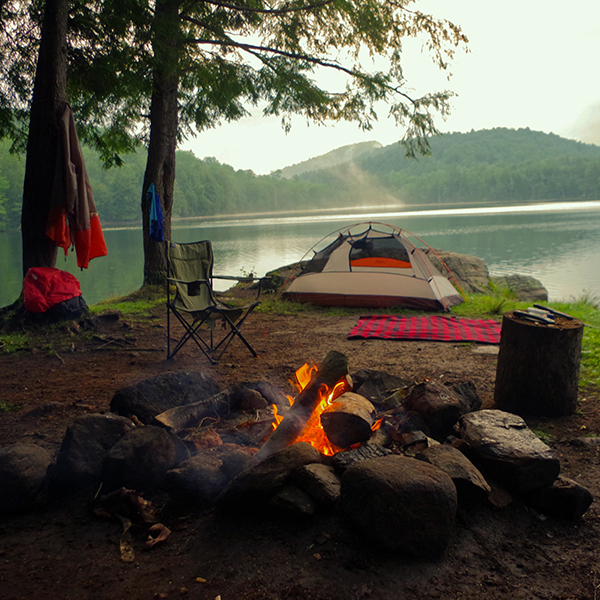How to be a happy camper

Tent…check.
Sleeping bag…check.
S'mores…check!
Across Canada, camping is a great way to connect with nature. Before you head out on your next adventure, check out these important tips to help protect yourself and the environment.
1. Buy local, burn local
Invasive insects, plants and plant diseases pose a threat to our trees, parks, air and ecosystems, - and the businesses that rely on them.
Transporting untreated firewood to or from a campground or cottage may seem harmless, but it can spread pests such as the emerald ash borer, hemlock woolly adelgid, oak wilt and others. These pests have already destroyed millions of trees in Canada.
If you like to get toasty by the fire, buy your firewood at your destination, or use heat-treated or kiln-dried wood instead of bringing your own.
The Canadian Food Inspection Agency (CFIA), in partnership with the province of Prince Edward Island (PEI) and the PEI Invasive Species Council, recently installed Don't Move Firewood bins at entry points to PEI. These bins allow campers to safely dispose of any untreated firewood they may have brought along with them.
2. Bye bye, bugs
Use mosquito netting when sleeping outside, wear bug spray, and opt for light-coloured clothing to help keep those pesky insects at bay. You're more likely to get bitten by a mosquito during a full moon, so you may want to plan your camping trip accordingly.
Before heading out on your camping trip or coming back home from one, check your trailer, tent, chairs and gear that's been left outside for unwanted insects like the LDD moth. This invasive species has been snacking on tree leaves and destroying forests, parks and urban trees across eastern Canada.
LDD moths lay their eggs pretty much anywhere. Don't take them with you! If you notice egg masses on any of your gear, scrape them off and put them in a bucket of soapy water for a few days to destroy them.
3. Avoid food poisoning
Preparing meals at a campsite can be tricky. With no refrigerator or oven, it can be challenging to store and cook food properly to avoid getting sick.
There are a few causes of food poisoning. Many foodborne illnesses can be prevented by following these safe food-handling practices even while camping: clean, separate, cook and chill. For more information, read these food safety tips from Health Canada!
4. Protect nature (and clean up like a pro)
Trash-covered grounds are harmful to the environment and the surrounding wildlife, expensive for parks to clean up, and can injure the next campers moving in.
Environment and Climate Change Canada launched the Protect Nature Challenge to inspire you to incorporate a few actions into your daily life, such as supporting protected and conserved areas, beating plastic pollution and becoming a citizen scientist.
Be a Canadian plant health hero! The CFIA challenges everyone to get involved in plant protection and help make a difference. There are even activity books for kids from ages 5-8 and 9-12.
5. Last but not least: have fun
Whether you're an avid or first-time camper, it's important to follow all campsite rules and respect your surroundings. Doing so will allow everyone to experience all the fun that camping has to offer!
Learn more
- Plant pests and invasive species
- Pass the Mic: talking about emerald ash borer signs and symptoms
- Bye bye beetle
- Podcast – Community science: more than a hobby
- Camping 101: What to know before staying the night (Parks Canada)
- Food Safety Tips (Health Canada)
- Extreme heat and human health (Health Canada)
Get more Inspect and Protect
- Want to learn more about what we do? Explore articles, videos and podcasts.
- Interested in reporting on a story? Contact CFIA Media Relations to arrange an interview with one of our experts.
- Have an idea or feedback to share? Get in touch!
- Date modified: